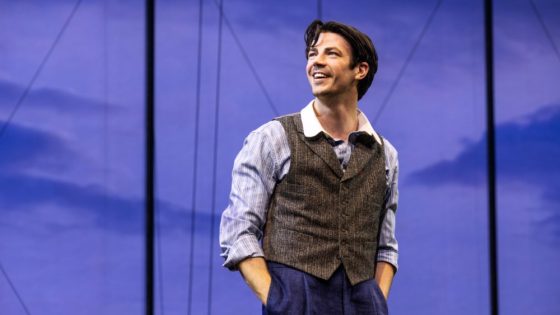The music and lyrics in Broadway’s “Water for Elephants” are expansive and a rich tapestry of American music ranging from folk, to swing, jazz and bluegrass.
PigPen, a collective of seven musicians (Alex Falberg, Arya Shahi, Ben Ferguson, Curtis Gillen, Daniel Weschler, Matt Nuernberger and Ryan Melia) is also a theater company, and that uniqueness made them the perfect fit to bring the show’s music to life.
The transition to bring the story to a stage first started in 2014 when PigPen Theatre Co., did a workshop with Rick Elice, “Water for Elephants” scriptwriter, for a different show. While the collaboration worked, the project itself fell through. Until, Peter Schneider, the lead producer, approached Elice on potentially adapting the show. Elice was all in—under one condition: the men in PigPen had to be involved.
In finding the music, Weschler said, “We wanted to write music that accomplished a lot of different things at the same time. So in one respect, a lot of these songs just sound like classic songs of their era.” He continues, “It’s a memory play, we’re able to view them through a kind of contemporary lens, we’re able to take some sort of unexpected turns.”
“Water for Elephants” is based on Sara Gruen’s 2006 novel of the same name, and also inspired the 2011 Robert Pattinson film. The story follows Jacob Jankowski played by Grant Gustin as a veterinary student, who runs away from his run and finds a traveling circus. In his new community, Jacob works closely with Marlena (Isabelle McCalla), a circus performer. The two eventually bond over their shared love for an elephant named Rosie. But, as Jacob soon learns, Marlena is married to August played by Paul Alexander Nolan, who also happens to be an abusive husband.
The idea of the show taking place across a cross-country train made PigPen excited to work on “Water for Elephants,” especially since they could blend in emerging genres to tell the story. But, even more exciting for the collective, was how they could use instruments to bring the voices of animals to life, and how they could weave in their puppeteering experience.
“We tried to find the moments where the music can be hyper-theatrical,” said Shahi. Any sounds associated with Rosie’s trunk came from the brass section. He continued, “The reveal of Rosie being very piecemeal was abstract, and so we’re using a theatrical language. But when we see Rosie give the full thing you hear a full elephant ‘horn.’”
Similarly, when Silver Star is hurt, there is a more abstract drum sound of the hoof. Shahi said, “There are moments of real specific music integration, but then there’s also just our experience in puppetry has led us to learn that there are a lot of ways to not only use your own voice to create animal sounds. I think the idea for us was to find the tool that is best serving that moment in the story.”
Over the eight-year course of writing the show, the most challenging part was coming back to the book’s source material in every workshop and building a new narrative, to stay consistent in building complex characters. “You’d have to sort of reaffirm all of the motivations of August the villain and how do we walk the line and making him human, but also making him have danger, but also be compelling,” Nuernberger said.
Source Agencies



